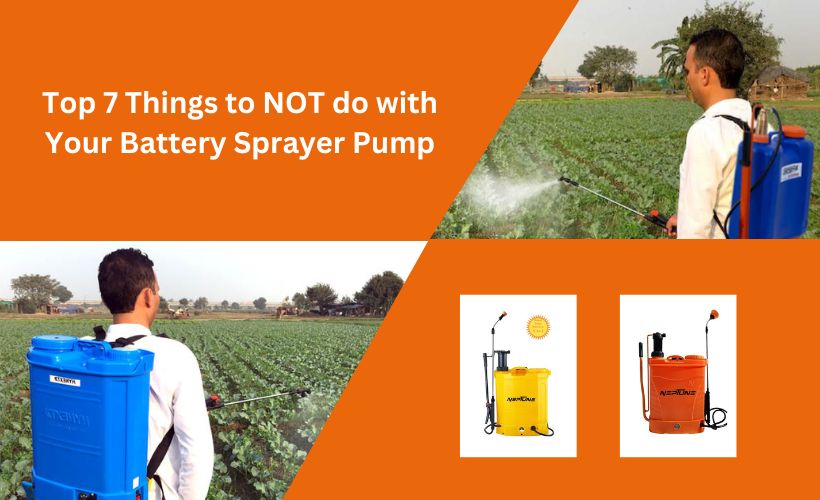The simplicity, effectiveness, and reduction of human work offered by battery sprayer pump, also known as battery-operated spray pumps, have completely changed agricultural spraying. Because they make it possible to precisely apply fertilizer, herbicides, and pesticides, they are invaluable to both farmers and gardeners. On the other hand, abuse may result in diminished efficiency, harm to equipment, or safety risks. To maintain longevity and safety with your battery operated sprayer pump, there are seven important habits to avoid.
1. Make Sure You Maintain Regularly
For your battery sprayer for agriculture to last a long time and perform well, proper maintenance is essential. Maintain a regular cleaning schedule for the nozzle and tank to avoid obstructions that could cause inconsistent spraying or equipment failure. If the pump is not cleaned after every use, contaminants may accumulate and corrode internal parts or reduce spray quality.
2. Take Care Not to Overcharge the Battery
Your agricultural spray machine with battery life may be considerably reduced by overcharging. There is a limit to how many times batteries may be charged, and overcharging can result in overheating, swelling, or leakage. Even though auto shut-off chargers are a common feature of modern battery sprayers, it’s still important to keep an eye on charging times.
3. Avoid Using Incompatible Substances
Not every chemical can be used with battery-operated sprayer pumps. Some solutions, especially those that are excessively corrosive or reactive, can harm the internal components. Make sure the chemicals you plan to use are compatible with the material and construction of the sprayer at all times.
4. Avoid Using Without Appropriate Safety Equipment
It can be dangerous to use a battery sprayer for agriculture without the appropriate safety equipment. Even chemical sprays approved for use on crops may pose a risk to human health if breathed or if skin contact occurs. To reduce the danger of exposure, always use the proper personal protective equipment (PPE), such as goggles, a mask, and gloves.
5. A Low or Dead Battery Should Not Be Used
Using your battery operated spray pump while the battery is low or almost dead might stress the pump motor and result in unpredictable spray patterns. This can cause early wear and tear in addition to affecting performance. Before using, always make sure the battery is fully charged.
6. Avoid Keeping in Adverse Environments
Both the battery and the sprayer’s internal parts may be harmed by storing your battery pump in extremely hot or cold conditions. While frigid conditions can make the materials brittle and more prone to fracture, excessive heat might cause the batteries to bulge or leak.
7. Take Wear and Tear Seriously
Even with regular maintenance, parts like hoses, nozzles, and seals may eventually wear out. Ignoring wear indicators increases the risk of leakage, decreased efficiency, or total pump failure. To keep your sprayer operating safely and effectively, give these components a regular inspection and replace them as necessary.
Conclusion
The longevity and performance of your rechargeable sprayer pump depend on proper handling and upkeep. You may maintain a dependable and efficient spraying system for gardening or agriculture by avoiding these typical blunders. To get the most out of your agriculture spray machine with battery, always follow the manufacturer’s instructions and put safety first.
Frequently Asked Questions
Q1. Which kinds of chemicals can be used with a battery-operated sprayer pump without risk?
The majority of spray pumps that run on batteries are made to handle typical agricultural chemicals including fertilizers, herbicides, and pesticides. For chemical compatibility, it’s crucial to consult the manufacturer’s instructions. Steer clear of using anything extremely abrasive or corrosive as this could harm the internal parts of the pump.
Q2. How frequently should my sprayer pump’s battery be charged?
Usage determines how frequently a device is charged. A fully charged battery should normally provide many hours of continuous use. If you have used up most of the battery’s capacity, it is best to charge it after every use. Check the battery’s level frequently, and don’t overcharge it.
Q3. If the spray coming from my sprayer pump isn’t uniform, what should I do?
A low battery, worn-out components, or clogged nozzles can all result in uneven spraying. First, make sure the battery is completely charged and inspect and clean the nozzles. If the issue continues, look for damage to the hoses and seals and replace any worn components.




